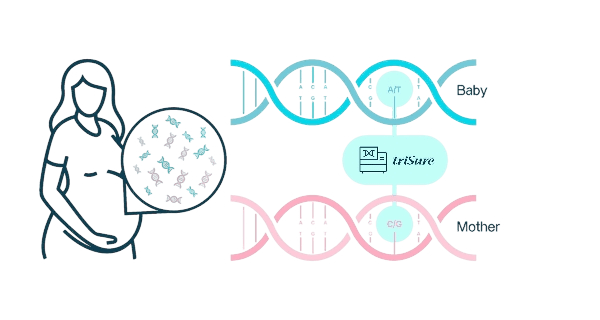What is triSure NIPT?
triSure is a non-invasive prenatal screening test that uses cell-free fetal DNA released into maternal blood for early detection of fetal risk of serious birth defects, which are common due to numerical chromosome abnormalities. It can be performed from the 9th week of pregnancy.
Early detection of common genetic birth defects in the fetus helps creates an opportunity for parents to manage pregnancy plans more effectively, while preparing for the next pregnancy.
Find out:
More than NIPT (All-in-1):
Aneuploidies and microdeletion
18 recessive disorders-carrier screening for mother
25 dominant single gene disorders
What is NIPT?
Non-invasive prenatal testing (NIPT)
From as early as 09 weeks of pregnancy, placental DNA is detectable in mother blood. NIPT provides a safe, highly accurate and non-invasive method (1) to test for genetic insights of the fetus, which is recommended by major societies worldwide (2).
Limitation:
- NIPT is a screening test, which means a high-risk result (positive or borderline) needs to be confirmed by diagnostic testing.
- NIPT testing was based on DNA released from the placenta, not the fetus. This is the main reason for the false-positive result (which means the NIPT is positive, but the fetus is normal) and the false negative result (which means the NIPT is negative, but the fetus is abnormal) if there are genetic differences between the placenta and the fetus.
- A ‘low risk’ result (negative result) is not completely ruled out OTHER GENETICALLY CHROMOSOMAL ABNORMALITIES of the fetus and gene is out of scope of testing.
American College of Obstetricians and Gynecologists (ACOG) recommends Non-Invasive Prenatal Testing (NIPT) be made available to all pregnant women, as a specialized technique for screening for fetal chromosomal abnormalities, and may be used in place of in addition to biochemical screening as appropriate.
- (1) Norton ME, Jacobsson B, Swamy GK, et al. Cell-free DNA analysis for noninvasive examination of trisomy. New England Journal of Medicine. 2015;372(17):1589–1597. doi:10.1056/nejmoa1407349.
- (2) ACOG Policies Priorities 2024.
What is the triSure NIPT test?
Unique combination of single-gene mutations and traditional NIPT
Chromosome
Abnormalities
Copy Number Variations (Microdeletion)
The uniqueness of triSure algorithm and technical process
- triSure assay with integrated mothers’ recessive diseases procedure is validated by peer-reviewed publication.(*)
- triSure is the NIPT test that reduces the need for amniocentesis, 25 times more than other biochemical tests.(**)
- The triSure algorithm uniquely distinguishes between fetal and maternal DNA, aiding in the recognition of maternal mosaicism and fetal abnormalities to enhance test accuracy and minimize false positive cases.(***)

(**) Published in the Vietnamese Medical Journal “Investigate positive predictive values of NIPT triSure noninvasive prenatal test in medical practice” by Patricia AT, et al (2016); “Noninvasive prenatal testing in the general obstetric population: clinical performance and counselling considerations in over 85,000 cases”, Prenatal Diagnosis, 36, 237 243 & Petersen AK, et al. (2017). “PPV estimates for cell-free noninvasive prenatal screening from data of a large referral genetic diagnostic laboratory”, Am J Obstet Gynecol; 217:691. e1-6.
(***) International publication “Reducing false positive rate of foetal monosomy X in non invasive prenatal testing using a combined algorithm to detect maternal mosaic monosomy X”.
How does triSure NIPT test work?
ISO 15189:2022 Lab Standard EMQN Proficiency Testing
Request the test
First trimester from as early as 09 weeks of pregnancy
- Collect through 10ml blood in vacuum tube.
- Pre-test counseling & signed consent form is required.
Sequencing of cfDNA
Extract cell-free DNA from plasma, then DNA library is sequenced by Next-Generation Sequencing systems (Illumina, Element Biosiences)
AI-driven data analysis
algorithm
AI-driven data analysis: proprietary novel machine learning algorithm with superior performance. (1)
- >99% Sensitivity & Specificity
- >94% PPV for T21/18/13
- >99% NPV
Returning results
Results are return to Doctors and patients within 7-10 days:
- Aneuploidies
(all trisomies & sex chromosome) - Microdeletion 22q11.2
(Di George syndrome) - 25 dominant single-gene disorders
(7,500 points mutations) - 18 common recessive disorders
(7,535 points mutations)